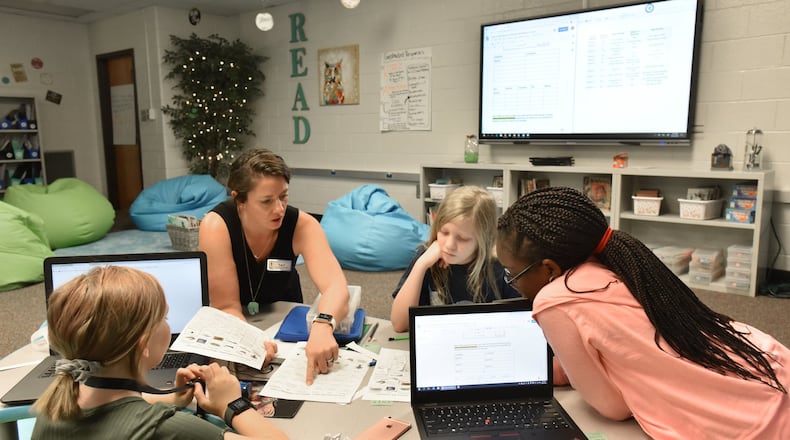Along with focusing on reading, writing and arithmetic, more educators in the past few decades have striven to get students to take an active role in their learning. Instead of passively taking in the information such as in lectures or by rote memorization, they want students to engage with the lessons and ultimately perform better. Many think this can only occur face-to-face but education research says online courses can also be effective.
In its 10th year, Gwinnett Online Campus has proved that. With 7,900 courses offered, the program works with schools across the district. It offers choices for students from fourth grade through high school as full-time online learners who work from home, or students who take up to five online classes as part of their regular school day through supplemental programs.
“The days of teaching just one way are over,” said Principal Christopher Ray. “Our method allows teachers to see in real time what students need. If someone if falling behind, there’s an opportunity to pull them out for extra instruction right away. Or if a student is excelling, they can work ahead without it affecting the flow of the class.”
Related story: Multi-million dollar upgrades go online in Gwinnett middle schools
Related story: Gwinnett school helps students become veterinarians
In “blended classrooms” with online courses and regular, in-person teachers, introduced this year at McConnell Middle School and in use for several years in three elementaries, everyone isn’t working at the same pace.
“I don’t have to wait for a test or a quiz to know which students have caught on,” said teacher Melissa Murphy.
“Besides the lesson content, the students are learning soft skills,” such as creative thinking and decision making, said Murphy. And they’re also proficient in a lot of the latest technology.
There are no textbooks, and every student uses a laptop to access class materials. Teacher-created digital lessons allow for targeted instruction, learner-focused flexibility and quality content.
This is in line with a growing trend. A survey released earlier this year from Cambridge International, a global education service, found that 48% of students reported they use a desktop computer in the classroom. Forty-two percent use smart phones, 33% use interactive whiteboards and 20 percent use tablets.
While in learning labs, students move through multiple stations, depending on their instruction needs and learning styles. Each course can be tailored so students can review certain concepts multiple times or work through the material at a faster pace.
But there are more similarities than differences between online and traditional class work, according school officials.
“Students have lessons, homework, due dates, class discussions, tests, live class time and they still interact with their teachers,” said Christine Austin, an assistant principal. “The main difference is that they’re doing it over the internet.”
Austin is one of eight educators from around the country to receive the 2019 Innovative Educator Prize given by The Foundation for Blended and Online Learning. The competition recognizes teachers and school leaders who use blended and online learning to move beyond current constraints in the education system. Austin was selected after creating a personalized learning center prototype to spur classroom innovation, including models of small group, teacher-directed instruction; collaborative project-based learning engagements; and targeted, individualized experiences aligned with courses taught at Gwinnett Online Campus.
“All instruction is designed around a curriculum map. Students may cross the finish line at different rates, but it’s at the same place,” she said. “They can’t hide in the online environment. The teacher is still a very important part of the team.”
The school has been collecting data to show what works and what needs adjustments.
“Education is always changing, and what we do probably changes more quickly,” said Ray.
The state recently released school-level SAT scores, and Gwinnett Online Campus had the third highest average in the district and the 26th highest in the state. The school scores consistently in the top 10% in the state on ACT as well. And Ray added that online students test as well as those in brick-and-mortar schools.
Ray said he wouldn’t be surprised if in the next few decades every student was involved in some level of online learning.
“It’s changing the dynamic of learning,” he said. “Schools will be able to personalize instruction for each student. It’s a trend that showing success.”
Gwinnett County schools that partner with Gwinnett Online Campus
Elementary Blended Classrooms
Dyer, Alcova, Jenkins
Middle School Blended Classroom
McConnell
High School Online Centers
Collins Hill, Central Gwinnett, Dacula, Duluth, Norcross, Phoenix, Shiloh, South Gwinnett, GIVE
East, GIVE West
Source: Gwinnett Online Campus
Characteristics of successful online learners
Able to stay on task
Reach out for help when needed and communicates with teachers
Organize work and time effectively
Have a parent/guardian who checks progress regularly
Enjoy working with technology
Ask questions and desires to learn new things
Comfortable working independently
Complete assignments in a flexible setting
Source: Gwinnett Online Campus
About the Author
The Latest
Featured


